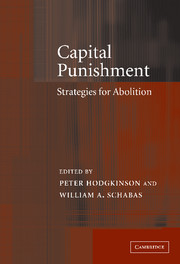Book contents
- Frontmatter
- Contents
- List of figures
- List of tables
- Notes on the contributors
- 1 Capital punishment: improve it or remove it?
- 2 International law and the death penalty: reflecting or promoting change?
- 3 Doctors and the death penalty: ethics and a cruel punishment
- 4 Replacing the death penalty: the vexed issue of alternative sanctions
- 5 Religion and the death penalty in the United States: past and present
- 6 On botched executions
- 7 Death as a penalty in the Shari'ā
- 8 Abolishing the death penalty in the United States: an analysis of institutional obstacles and future prospects
- 9 Capital punishment in the United States: moratorium efforts and other key developments
- 10 The experience of Lithuania's journey to abolition
- 11 The death penalty in South Korea and Japan: ‘Asian values’ and the debate about capital punishment?
- 12 Georgia, former republic of the USSR: managing abolition
- 13 Capital punishment in the Commonwealth Caribbean: colonial inheritance, colonial remedy?
- 14 Public opinion and the death penalty
- 15 Capital punishment: meeting the needs of the families of the homicide victim and the condemned
- Index
9 - Capital punishment in the United States: moratorium efforts and other key developments
Published online by Cambridge University Press: 22 September 2009
- Frontmatter
- Contents
- List of figures
- List of tables
- Notes on the contributors
- 1 Capital punishment: improve it or remove it?
- 2 International law and the death penalty: reflecting or promoting change?
- 3 Doctors and the death penalty: ethics and a cruel punishment
- 4 Replacing the death penalty: the vexed issue of alternative sanctions
- 5 Religion and the death penalty in the United States: past and present
- 6 On botched executions
- 7 Death as a penalty in the Shari'ā
- 8 Abolishing the death penalty in the United States: an analysis of institutional obstacles and future prospects
- 9 Capital punishment in the United States: moratorium efforts and other key developments
- 10 The experience of Lithuania's journey to abolition
- 11 The death penalty in South Korea and Japan: ‘Asian values’ and the debate about capital punishment?
- 12 Georgia, former republic of the USSR: managing abolition
- 13 Capital punishment in the Commonwealth Caribbean: colonial inheritance, colonial remedy?
- 14 Public opinion and the death penalty
- 15 Capital punishment: meeting the needs of the families of the homicide victim and the condemned
- Index
Summary
Introduction
There have been two diverging characteristics of capital punishment in the United States in the last several years. On the one hand, the actual implementation of capital punishment has become even less fair. On the other hand, press reportage and public awareness about pervasive problems with the death penalty system have greatly increased. These developments are not unrelated. The increasing unfairness of the United States' death penalty system is a major reason why that system has undergone increased scrutiny.
In view of these developments, support has grown for efforts to implement a moratorium on executions, and to use the time during which a moratorium is in place to undertake a comprehensive study of the capital punishment system and decide whether to retain it and, if so, in what form. In addition, support has grown for specific legislative and judicial reforms. Such support has increasingly come from what previously would have been extremely surprising sources. There is an increasing potential for dealing with capital punishment non-ideologically, by focusing not on whether one would support a non-existent, hypothetically idealised capital punishment system but rather on what we should do about the actual death penalty system.
There is a growing recognition that when one looks at capital punishment pragmatically, it is like Hans Christian Anderson's ‘emperor's new clothes’: there is nothing positive there in reality (as opposed to the idealised fantasy). If this trend continues, more United States jurisdictions could initiate moratoriums, and some might abolish capital punishment.
- Type
- Chapter
- Information
- Capital PunishmentStrategies for Abolition, pp. 208 - 232Publisher: Cambridge University PressPrint publication year: 2004



